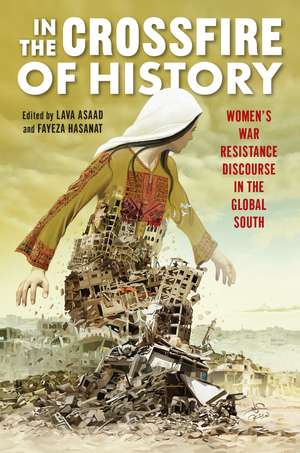In the Crossfire of History: Women's War Resistance Discourse in the Global South: War Culture
Editat de Lava Asaad, Fayeza Hasanat Contribuţii de Farzana Akhter, Margaret Hageman, Nyla Khan, Shafinur Nahar, Doaa Omran, Carolyn Ownbey, Moumin Quazi, Lucia Garcia-Santana, Stefanie Sevcik, Matthew Spenceren Limba Engleză Paperback – 16 sep 2022
The transformative mode of these examples expands the definition of heroism and defiance. To prevent these types of heroism from slipping into the abyss of history, this collection brings forth and celebrates women’s fortitude in conflict zones. In the Crossfire of History shines a light onwomen across the globe who are resisting the sociopolitical and economic injustices in their nation-states.
Preț: 267.55 lei
Nou
Puncte Express: 401
Preț estimativ în valută:
51.20€ • 53.32$ • 43.27£
51.20€ • 53.32$ • 43.27£
Carte indisponibilă temporar
Doresc să fiu notificat când acest titlu va fi disponibil:
Se trimite...
Preluare comenzi: 021 569.72.76
Specificații
ISBN-13: 9781978830219
ISBN-10: 1978830211
Pagini: 214
Ilustrații: 13 b&w images
Dimensiuni: 156 x 235 x 25 mm
Greutate: 0 kg
Editura: Rutgers University Press
Colecția Rutgers University Press
Seria War Culture
ISBN-10: 1978830211
Pagini: 214
Ilustrații: 13 b&w images
Dimensiuni: 156 x 235 x 25 mm
Greutate: 0 kg
Editura: Rutgers University Press
Colecția Rutgers University Press
Seria War Culture
Notă biografică
LAVA ASAAD is a postdoctoral teaching fellow at Auburn University in Alabama. She is the author of Literature with a White Helmet: The Textual-Corporeality of Being, Becoming and Representing Refugees.
FAYEZA HASANAT completed her MA and PhD in English from the University of Florida. She is the author of Nawab Faizunnesa’s Rupjalal: Translation and Commentary and The Voices of War Heroines: Sexual Violence, Testimony, and the Bangladesh Liberation War. Her debut short story collection, The Bird Catcher and Other Stories, was simultaneously published in the United States and Bangladesh. Hasanat teaches at the English Department of the University of Central Florida, Orlando.
FAYEZA HASANAT completed her MA and PhD in English from the University of Florida. She is the author of Nawab Faizunnesa’s Rupjalal: Translation and Commentary and The Voices of War Heroines: Sexual Violence, Testimony, and the Bangladesh Liberation War. Her debut short story collection, The Bird Catcher and Other Stories, was simultaneously published in the United States and Bangladesh. Hasanat teaches at the English Department of the University of Central Florida, Orlando.
Cuprins
Introduction: Portraits of Resistances
Part I: Representation of Resistance in Art and Media
Chapter 1: Syrian Women’s Prison Art: Toward a Poetics of Creative Insurgency
Stefanie Sevcik
Chapter 2: Moving beyond Victimhood: Female Agency in Bangladeshi War Movies
Farzana Akhter
Chapter 3: Structuring Jinelogy within Global Feminism: Representations of Kurdish Women Fighters in Western Media
Lava Asaad
Part II: Literature and Resistance
Chapter 4: All the Female Bodies: Female Resistance and Political Consciousness in Testimonies of the Dirty War in Argentina
Lucía García-Santana
Chapter 5: The Woman from Tantoura: An Autotheoretical Reading in the Art of Resistance
Doaa Omran
Chapter 6: South Asian Women and Hybrid Identities: Narratives of Abduction and Displacement in Partition Literature
Margaret Hageman
Chapter 7: Writing Solidarity: Women in Bapsi Sidhwa’s Cracking India
Carolyn Ownbey
Chapter 8: Sri Lankan Postcolonial Inversion and a “Thousand Mirrors” of Resistance
Moumin Quazi
Part III: Advocacy / Activism
Chapter 9: Kashmiri Women Activists in the Aftermath of the Partition of India
Nyla Ali Khan
Chapter 10: Teaching Narratives of Rape Survivors of the Bangladesh War in a Classroom: A Study on University Students
Shafinur Nahar
Chapter 11: They Fear Us Because We are Fearless: Women-Led Global Environmental Advocacy and its Adversaries
Matthew Spencer
Conclusion: Detangling Resistance
Notes on Contributors
Index
Part I: Representation of Resistance in Art and Media
Chapter 1: Syrian Women’s Prison Art: Toward a Poetics of Creative Insurgency
Stefanie Sevcik
Chapter 2: Moving beyond Victimhood: Female Agency in Bangladeshi War Movies
Farzana Akhter
Chapter 3: Structuring Jinelogy within Global Feminism: Representations of Kurdish Women Fighters in Western Media
Lava Asaad
Part II: Literature and Resistance
Chapter 4: All the Female Bodies: Female Resistance and Political Consciousness in Testimonies of the Dirty War in Argentina
Lucía García-Santana
Chapter 5: The Woman from Tantoura: An Autotheoretical Reading in the Art of Resistance
Doaa Omran
Chapter 6: South Asian Women and Hybrid Identities: Narratives of Abduction and Displacement in Partition Literature
Margaret Hageman
Chapter 7: Writing Solidarity: Women in Bapsi Sidhwa’s Cracking India
Carolyn Ownbey
Chapter 8: Sri Lankan Postcolonial Inversion and a “Thousand Mirrors” of Resistance
Moumin Quazi
Part III: Advocacy / Activism
Chapter 9: Kashmiri Women Activists in the Aftermath of the Partition of India
Nyla Ali Khan
Chapter 10: Teaching Narratives of Rape Survivors of the Bangladesh War in a Classroom: A Study on University Students
Shafinur Nahar
Chapter 11: They Fear Us Because We are Fearless: Women-Led Global Environmental Advocacy and its Adversaries
Matthew Spencer
Conclusion: Detangling Resistance
Notes on Contributors
Index
Recenzii
“This is a timely intervention in women’s resistance from the Global South that maps the complex labyrinth of women’s opposition, agency, advocacy through various forms of art, literature, and activism. Removed from the 'strait-jacket' of organized resistance, it is a must-read for scholars, students, activists interested in women’s voices and actions from the South as they defy and negotiate with micro and macro political structures of power.”
"This powerful set of essays refuses conventional tropes of female agency in the liberal tradition; instead, the authors theorize a politics and poetics of “resistance” that is context-specific, place based and plural. The volume, which takes the reader to geographical spaces that are often marginalized in feminist analyses, is a welcome addition to the emerging field of decolonial feminist scholarship."
Descriere
This book incorporates literary works, testimonies, autobiographies, women’s resistance movements, and films that add to the conversation on the resilience of women in the global south. The essays question historical accuracy and politics of representation that usually undermine women’s role during conflict, and they reevaluate how women participated, challenged, sacrificed, and vehemently opposed war discourses that work on obliterating women’s role in shaping resistance movements.















